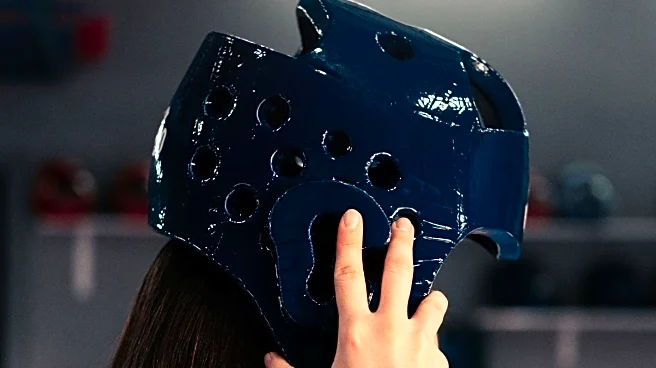What is the story about?
What's Happening?
A new diagnostic tool, the Fastball EEG test, has been developed to identify memory issues associated with Alzheimer's disease in just three minutes. This test measures brain responses to images flashed on a screen, offering a non-invasive and quick method to flag potential Alzheimer's cases. The test was evaluated in a study involving 106 participants, including healthy adults and individuals with mild cognitive impairment (MCI). Results showed that the test could distinguish between those with memory-specific problems linked to early Alzheimer's and those with other cognitive issues. The Fastball EEG test provides a promising alternative to traditional cognitive screening tests, which are time-consuming and influenced by various factors such as education level and test-related anxiety.
Why It's Important?
The Fastball EEG test represents a significant advancement in Alzheimer's disease diagnosis, potentially allowing for earlier intervention and management of the condition. Early detection is crucial as Alzheimer's disease progresses slowly, causing irreversible damage to brain cells. By identifying individuals at risk sooner, healthcare providers can implement lifestyle changes and therapies that may slow disease progression. This test could also reduce the reliance on expensive and invasive diagnostic methods like brain scans and cerebrospinal fluid analysis, making Alzheimer's screening more accessible and less stressful for patients.
What's Next?
Further studies are needed to validate the Fastball EEG test across diverse populations and conditions that also cause memory impairment, such as depression and thyroid issues. Researchers are also exploring other diagnostic tools, including blood tests that measure proteins linked to Alzheimer's, which could complement the Fastball EEG test. If successful, these advancements could shift Alzheimer's care from late diagnosis to early intervention, improving patient outcomes and potentially reducing healthcare costs associated with advanced disease management.
Beyond the Headlines
The development of the Fastball EEG test highlights the growing emphasis on non-invasive and rapid diagnostic methods in healthcare. This approach not only enhances patient comfort but also broadens access to early detection tools, particularly in underserved communities. As diagnostic technologies evolve, ethical considerations regarding data privacy and the potential for overdiagnosis must be addressed to ensure responsible implementation in clinical practice.
















